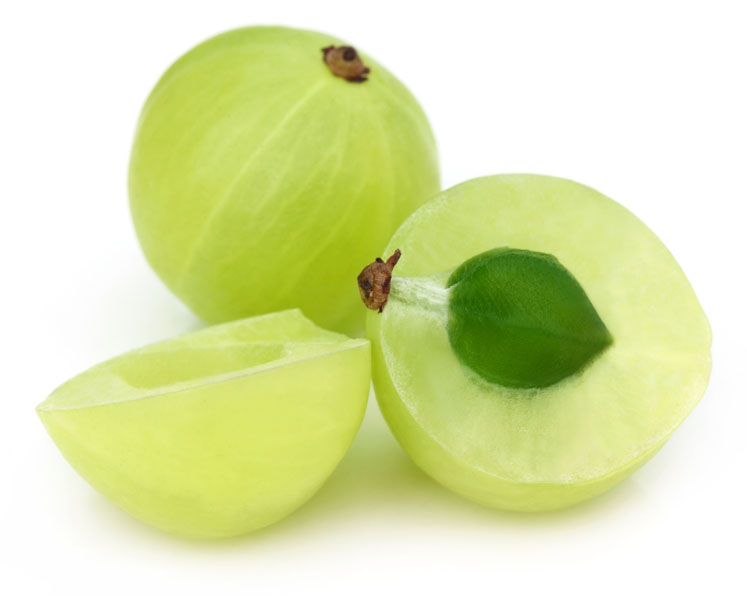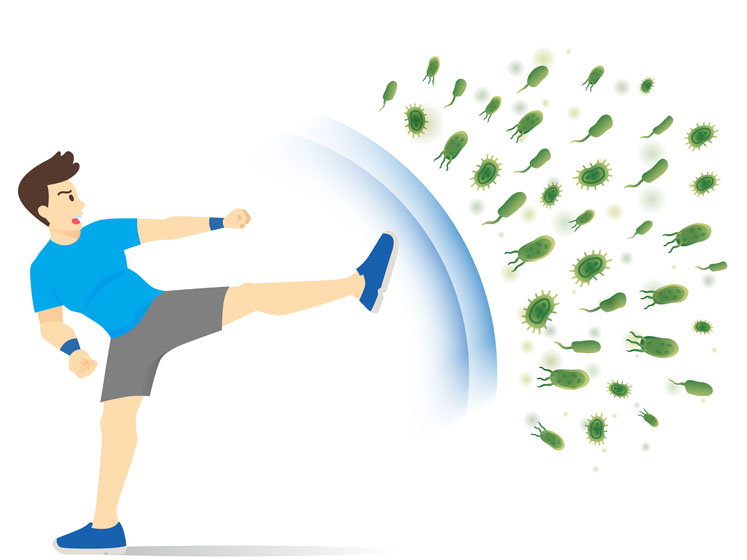As an application, the European Society for Clinical Nutrition and Metabolism (ESPEN) provided practical recommendations for the nutritional management of COVID-19 patients, highlighting the importance of nutrients and phytonutrients involved in the immune system.1
Vitamin C
Vitamin C is essential for the immune system. It enhances the motility of neutrophils and macrophages, improves phagocytosis and augments microbial killing by facilitating apoptosis and decreasing necrosis. Vitamin C also enhances the differentiation and the proliferation of B and T-lymphocytes.
In addition, it plays a powerful antioxidant role and participates in the development and production of antibodies.2 Because vitamin C is a water-soluble vitamin, our body cannot store it and, as such, needs a regular and adequate intake.
Vidya Herbs makes an extract containing 15% natural vitamin C from Amla (Emblica officinalis). Amla is a valuable source of vitamin C because its tannins are also recognised for their involvement in the immune response.3
Our Amla extract is therefore an interesting matrix containing Vitamin C and other naturally present compounds, ensuring a “naturality” that’s as close as possible to the original fruit. Slightly more than 530 mg of Amla extract provides the 80 mg/day of vitamin C that’s recommended in Europe.
B Vitamins
B vitamins are essential micronutrients for all cellular life. They are involved in a myriad of metabolic and regulatory processes that are necessary for human health and need to be absorbed through the diet.4
Vitamin B2: Dealing with COVID-19 and its consequences (such as lung injuries), it is interesting to notice that vitamin B2 protects against oxidant-mediated inflammatory injury in lungs. Working with the immune system and in response to infection, vitamin B2 plays a key role in the regulation of the phagocytic activity of NADPH oxidase by generating superoxide anions and can also activate phagocytosis and the proliferation of macrophages and neutrophils.
Vitamin B2, for which EFSA has validated many physiological functions, is also particularly interesting regarding its involvement in iron metabolism — which is also implicated in the immune system. Our extract is obtained from the fruits of the guava tree (Psidium guajava). Its 2% riboflavin content means that just 70 mg/day corresponds with the European recommended daily dose.

Vitamin B6: Vitamin B6’s immune health role is linked to our intestinal barrier and mediated by the migration of lymphocytes. It is also involved in their proliferation, differentiation and maturation. Vitamin B6 is also involved in maintaining or increasing the cytotoxic activity of Natural Killer (NK) cells.
In terms of inflammation, this vitamin is required to produce cytokines and for the regulation of inflammation. Vitamin B6 also participates in the production and metabolism of amino acids needed to produce antibodies. Vitamin B6, which is officially recognised in Europe to affect the function of the immune system, can be found at a concentration of 0.1–0.5% in our vitamin B complex extract.
Our vitamin B complex extract also provides vitamins B1, B2, B3, B5, B7 and B9. A mixture of plants based on guava, lemon and holy basil is used to provide this extract — of which 200–1000 mg provide the 1.4 mg of vitamin B6 required daily in Europe.
Vitamin B9 (Folate): Vitamin B9 is involved in the regulation of immunity via the intestinal barrier by influencing the survival and regulation of T lymphocytes in the small intestine. Folates are also involved in the modulation of the cytotoxic activity of NK cells and are used to support the immune response.
They are necessary for the production and metabolism of antibodies, ensuring a sufficient response to antigens. Our vitamin B9 ingredient is obtained from lemons (Citrus limon) and its content of 5% allows the European recommended daily dose of 200 µg to be achieved with just 4 mg/day.
Iron
Vitamin C is officially recognised in Europe to improve the absorption of iron, which is an important mineral for the immune system. Iron supports innate immune cells as a factor involved in the destruction of bacteria, as a component of several enzymes required for immune cell function and the regulation of cytokines and the inflammatory response.We have developed an extract from Curry leaves (Murraya koenigii) containing 3% iron that achieves 100% of the recommended daily dose in less than 500 mg.

Zinc
Zinc (Zn) is an essential micronutrient because its deficiency leads to a suppressed immune response, both innate and adaptive, leading to an increased susceptibility to many infectious agents and an increase in the duration of the infection. The European Commission officially recognises the role of Zn in protecting the immune system.
Zn is necessary for NK cells and for the growth and differentiation of immune cells. It increases the phagocytic activity of certain macrophages. Our Zn-rich extract from guava (Psidium guajava) leaves is standardised at 4% Zn and achieves the recommended daily dose in less than 300 mg.
Selenium
Selenium (Se) is the other micronutrient that’s essential for proper immune function. It is present in the form of selenoproteins; acting at the level of leukocytes and NK cells, they play an important part in the antioxidant defence system.
Selenium is involved in the differentiation and proliferation of T lymphocytes and helps to maintain antibody levels. Selenium deficiency is linked to both mortality and disease severity, especially in cases of serious illness and sepsis. Our 0.5% extract is obtained from Indian mustard (Brassica juncea) and achieves the recommended daily dose in less than 20 mg.
Curcuma longa (Turmeric)
Curcumin is well-known for its anti-inflammatory profile, which may be useful in both acute and chronic inflammation. But, curcumin can also modulate the activation of innate and adaptive immune cells such as T-cells, B-cells, macrophages, neutrophils, NK cells and dendritic cells.
Interestingly, at low doses, curcumin can enhance antibody responses.5 In vitro and in vivo experiments have shown that its anti-inflammatory and immunomodulatory effects combine to sustain the immune system.6
Curcumin and pulmonary damaging viruses: An overreactive immune system can cause severe lung damage, leading to acute respiratory distress syndrome and mortality — as seen with the SARS-CoV-2 coronavirus.
The resulting cytokine storm could potentially be counteracted by curcumin as a result of its ability to exert protective effects by regulating the expression of both pro- and anti-inflammatory factors and by eliminating the reactive oxygen compounds that exacerbate the inflammatory response.7
Curcumin and COVID-19: At this time, COVID-19 infected patients have not received any curcumin treatment. Owing to its identified clinical effects, curcumin could be an effective way to manage the symptoms of patients infected with COVID-19.8,9
Based on the Ayurveda principles of immune health and the broad-spectrum antiviral properties of curcumin, its combination with zinc is hypothesised by some authors to be a therapeutic approach with a concerted antiviral action.10
Conclusion
Assessing the role of certain vitamins, mineral and phytonutrients — such as curcumin — as regulators of immune function, immunonutrition is fundamentally linked to the concept food being “our first medicine.” As such, Vidya Herbs encourages the use of natural origin ingredients as a way to improve our health and well-being.
References
- R. Barazzoni, et al., “ESPEN Expert Statements and Practical Guidance for Nutritional Management of Individuals with SARS-CoV-2 Infection,” Clin. Nutr. 39(6), 1631–1638 (2020).
- A.C. Carr and S. Maggini, “Vitamin C and Immune Function,” Nutrients 9(11), 1211 (2017).
- I. Jantan, et al., “An Insight into the Modulatory Effects and Mechanisms of Action of Phyllanthus Species and Their Bioactive Metabolites on the Immune System,” Front. Pharmacol. 10, 878 (2019).
- C.T. Peterson, et al., “B Vitamins and Their Role in Immune Regulation and Cancer,” Nutrients 12(11), 3380 (2020).
- G.C. Jagetia and B.B. Aggarwal, “Spicing Up of the Immune System by Curcumin,” Journal of Clinical Immunology 27(1), 19–35 (2007).
- M. Catanzaro, et al., “Immunomodulators Inspired by Nature: A Review on Curcumin and Echinacea," Molecules 23(11), 2778 (2018).
- Z. Liu Z and Y. Ying, “The Inhibitory Effect of Curcumin on Virus-Induced Cytokine Storm and Its Potential Use in the Associated Severe Pneumonia,” Front. Cell Dev. Biol. 8, 479 (2020).
- F. Babaei, et al., “Curcumin (A Constituent of Turmeric): New Treatment Option Against COVID-19,” Food Sci. Nutr. 8(10), 5215–5227 (2020).
- F. Zahedipour, et al., “Potential Effects of Curcumin in the Treatment of COVID-19 Infection,” Phytother. Res. 34(11), 2911–2920 (2020).
- A. Roy, et al., “Can Concomitant Use of Zinc and Curcumin with Other Immunity-Boosting Nutraceuticals be the Arsenal Against COVID-19?” Phytother. Res. 34(10), 2425–2428 (2020).
